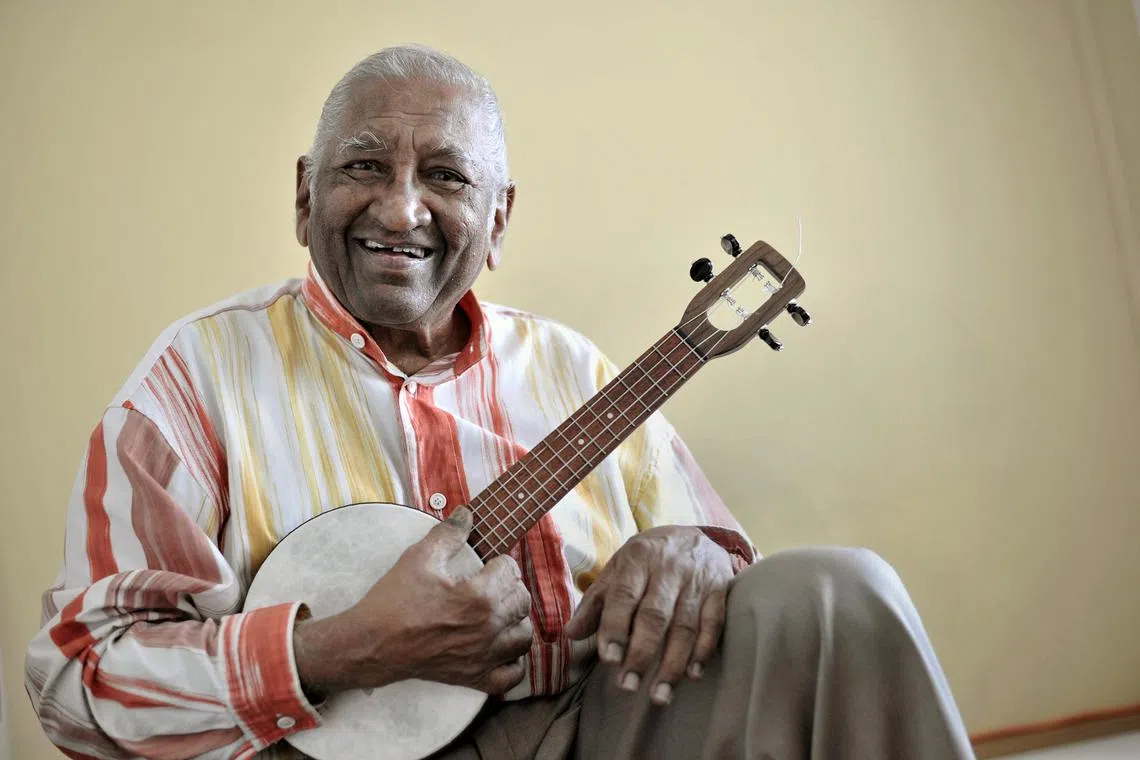‘Good night, Uncle Alex’: Father of Singapore guitar Alex Abisheganaden dies at 97
Sign up now: Get ST's newsletters delivered to your inbox

Pioneer musician Alexander S. Abisheganaden, perhaps the most important guitarist in Singapore history, died peacefully at St Luke’s Hospital on Friday, aged 97.
PHOTO: ST FILE
Follow topic:
SINGAPORE – Pioneer musician Alexander S. Abisheganaden, perhaps the most important guitarist in Singapore history, died peacefully at St Luke’s Hospital on Friday, aged 97.
He is survived by his wife Eileen Wong, 93, and his two children, singer-actress Jacintha, 65, and Peter, 63.
News of the passing of the “father of the guitar” was greeted by a chorus of eulogies on social media.
Jazz pianist, singer and composer Jeremy Monteiro said on his Facebook page: “Singapore has lost one of its most important musicians, national treasures and Cultural Medallion recipients.”
Theatre educator and director of Intercultural Theatre Institute Thirunalan Sasitharan quoted Shakespeare’s Hamlet on Facebook: “Now cracks a noble heart. Good night, sweet prince, and flights of angels sing thee to thy rest,” adding: “Good night, Uncle Alex.”
Born into an Indian Lutheran family of nine children in Singapore in 1926, Abisheganaden’s illustrious career as musician, composer and educator was kick-started by the singing of hymns and Christian songs.
He made his debut on stage as a singer at New World amusement park in Jalan Besar at just six years old, before teaching himself to play the guitar – the instrument that would make his name – at 15.
During the Japanese Occupation, it was this instrument that saved him, allowing him to play in an Indian orchestra for the Azad-Hind radio station.
His singing talent also prompted the Japanese to enlist him to sing Japanese folk and propaganda songs over the radio, a service which made sure his family was kept safe.
Post-war, he became first a teacher, the principal of several primary schools, then the Inspector of Schools at the Ministry of Education, all while playing double bass for the Singapore Junior Symphony Orchestra, which had agreed to loan him the instrument if he paid for his own formal lessons.
A project initiated by the Ministry of Education in the early 1970s established him as a classical guitar maestro: To keep teenagers away from the use of recreational drugs, then Minister for Education Goh Keng Swee got Abisheganaden to teach classical guitar on television.
The resulting 26-episode programme titled Music Making With The Guitar raised the profile of classical guitar in Singapore immensely, and featured original works such as the iconic 16-bar-long Katong Blues, meant for improving players’ techniques.
Abisheganaden would go on to acquire a reputation for arranging popular South-east Asian songs in a style suitable for the guitar ensemble, including The Pursuit, composed by Dick Lee and popularised by Leslie Cheung, and Tagalog song Anak by Filipino musician Freddie Aguilar.
He also frequently blended elements of Indian and Chinese folk music traditions in his original compositions. Huan Yin-Vanakam, for instance, is a double concerto he wrote in 1995 for the sitar, erhu and guitar orchestra.
In 1981, he founded the National University of Singapore Guitar Ensemble. For his contributions to music in Singapore, he was conferred the Cultural Medallion in 1988.
Composer Mark Chan, 64, said he spent his formative years playing guitar with Abisheganaden in his house while Jacintha sang.
“He was a wonderfully warm man, very talented and perceptive. He had a way of always treating me like an equal even though I was a teenager when I first got to know him. It was that that really encouraged me to continue with music,” he told The Straits Times.
“Those who knew him will remember the most important things: his musicality, humility and perceptiveness of music and social situations,” he added. “For most of us, he has left behind a legacy of being human even as he excelled in music.”
Film-maker Tan Pin Pin, 53, said Abisheganaden was not just a consummate musician, but also a very generous one.
He appeared in Tan’s documentary, Singapore GaGa (2005), in which he and harmonica player Yew Hong Chow accompanied each other on their respective instruments.
“This (generous) spirit has infused his role as a music educator and his friendships,” Tan said. “Though he spoke English and Chow spoke Mandarin, together they communicated through the language of music and spun beautiful tunes together for the film.”
Ms Jobina Tan, head of NUS Centre for the Arts, said Abisheganaden will be sorely missed.
“NUS Guitar Ensemble’s reputation as one of the leading youth guitar ensembles is largely due to the foundations he has laid, and his works continue to be performed at its annual concerts which he would always attend when he was able.
“He was always gentle, gracious and cheerful with his students and fellow tutors.”
Jacintha said she and her brother remember riding in the back of their father’s Jaguar on Saturdays and buying records at Beethoven Record House in Orchard Road when they were children.
When her friends stayed over, he would also leave some money in an envelope on the piano so that they could eat lunch or have a tea treat. “They called him Captain Midnight, because the envelopes would ever appear only in the middle of the night.”
Abisheganaden’s wake will be held on Saturday at Ang Yew Seng Remembrance Hall from 1pm. Service will be at 8pm.

